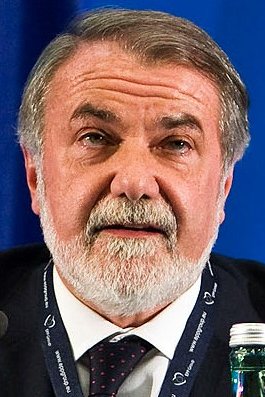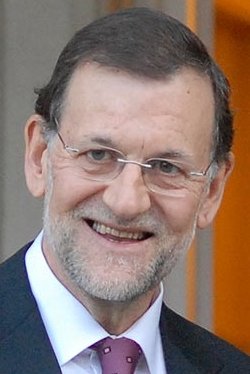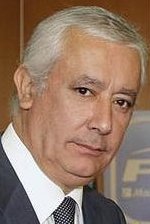
A parliamentary system, or parliamentary democracy, is a system of democratic government where the head of government derives their democratic legitimacy from their ability to command the support ("confidence") of the legislature, typically a parliament, to which they are accountable.

The Spanish Socialist Workers' Party is a social-democratic political party in Spain. The PSOE has been in government longer than any other political party in modern democratic Spain: from 1982 to 1996 under Felipe González, from 2004 to 2011 under José Luis Rodríguez Zapatero, and since 2018 under Pedro Sánchez.

The Communist Party of Spain is a communist party that, since 1986, has been part of the United Left coalition, which is part of Sumar. Two of its politicians are Spanish government minister, the Minister of Labour and Social Economy and the Minister of Youth and Children.

The Senate is the upper house of the Cortes Generales, which along with the Congress of Deputies – the lower chamber – comprises the Parliament of the Kingdom of Spain. The Senate meets in the Palace of the Senate in Madrid.

The People's Party is a conservative and Christian-democratic political party in Spain.
An indirect election or hierarchical voting is an election in which voters do not choose directly among candidates or parties for an office, but elect people who in turn choose candidates or parties. It is one of the oldest forms of elections and is used by many countries for heads of state, cabinets, heads of government, and/or upper houses. It is also used for some supranational legislatures.

Elections in Chile are held nationwide, including the presidency, parliament, regional offices, and municipal positions. Chilean citizens and foreign residents with legal residency of at least five years, who are 18 years or older on election day, are eligible to vote. Previously, voting was voluntary, but since 2023, it has become compulsory.

Elections in Spain encompass four different types: general elections, regional elections, local elections, and elections to the European Parliament. General elections and regional elections are typically conducted at the conclusion of the national or regional legislative mandate, which usually spans four years since the previous election. However, early elections can be called in certain circumstances. On the other hand, local council elections and elections to the European Parliament follow fixed dates, although some local government bodies, such as provincial councils, are not directly elected. In most elections, a party-list proportional representation (PR) system is employed, while the Senate utilizes the plurality system.

Cádiz is one of the 52 constituencies represented in the Congress of Deputies, the lower chamber of the Spanish parliament, the Cortes Generales. The constituency currently elects nine deputies. Its boundaries correspond to those of the Spanish province of Cádiz. The electoral system uses the D'Hondt method and a closed-list proportional representation, with a minimum threshold of three percent.

The 2009 European Parliament election in Spain was held on Sunday, 7 June 2009, as part of the EU-wide election to elect the 7th European Parliament. All 50 seats allocated to Spain as per the Treaty of Nice—54 after the Treaty of Lisbon came into force on 1 December 2011—were up for election.

The 2011 Spanish general election was held on Sunday, 20 November 2011, to elect the 10th Cortes Generales of the Kingdom of Spain. All 350 seats in the Congress of Deputies were up for election, as well as 208 of 266 seats in the Senate. An election had not been due until April 2012 at latest, but a call by Prime Minister José Luis Rodríguez Zapatero for a snap election five months ahead of schedule was announced on 29 July 2011. Zapatero would not be seeking a third term in office, and with political pressure mounting, a deteriorating economic situation and his political project exhausted, an early election was perceived as the only way out.

¡Democracia Real YA!, also known as Plataforma Democracia Real Ya!, is a Spanish grassroots organization that started in March 2011 in Madrid, Spain. It sparked the political movement of May 15, 2011 (15M) whose protests gained worldwide attention. The protests been compared to the May 1968 social movement in France.

The 2015 Spanish general election was held on Sunday, 20 December 2015, to elect the 11th Cortes Generales of the Kingdom of Spain. All 350 seats in the Congress of Deputies were up for election, as well as 208 of 266 seats in the Senate. At exactly four years and one month since the previous general election, this remains the longest timespan between two general elections since the Spanish transition to democracy, and the only time in Spain a general election has been held on the latest possible date allowed under law.

The 2012 Andalusian regional election was held on Sunday, 25 March 2012, to elect the 9th Parliament of the autonomous community of Andalusia. All 109 seats in the Parliament were up for election. The election was held simultaneously with a regional election in Asturias.

This is the results breakdown of the Congress of Deputies election held in Spain on 20 November 2011. The following tables show detailed results in each of the country's 17 autonomous communities and in the autonomous cities of Ceuta and Melilla, as well as a summary of constituency and regional results.

Cádiz is one of the eight constituencies represented in the Parliament of Andalusia, the regional legislature of the Autonomous Community of Andalusia. The constituency currently elects 15 deputies. Its boundaries correspond to those of the Spanish province of Cádiz. The electoral system uses the D'Hondt method and a closed-list proportional representation, with a minimum threshold of three percent.

The 17th National Congress of the People's Party was held in Seville from 17 to 19 February 2012, to renovate the governing bodies of the People's Party (PP) and establish the party's main lines of action and strategy for the next leadership term. The congress slogan was "Committed to Spain", and it saw Mariano Rajoy, incumbent prime minister of Spain as a result of the PP victory at the 2011 Spanish general election, being re-elected unopposed for a third term as party president with 97.6% of the delegate vote in the congress and 2.4% of blank ballots (63).

This is the results breakdown of the Congress of Deputies election held in Spain on 10 November 2019. The following tables show detailed results in each of the country's 17 autonomous communities and in the autonomous cities of Ceuta and Melilla, as well as a summary of constituency and regional results.

Juan Carlos Campo Moreno is a Spanish judge and politician who served as minister of Justice and ex officio First Notary of the Kingdom from 2020 to 2021 and as Member of the Congress of Deputies from 2016 to 2020 representing Cádiz. Previously, he served as the 7th Secretary of State for Justice from 2009 to 2011 and as member of the General Council of the Judiciary from 2001 to 2008.

















